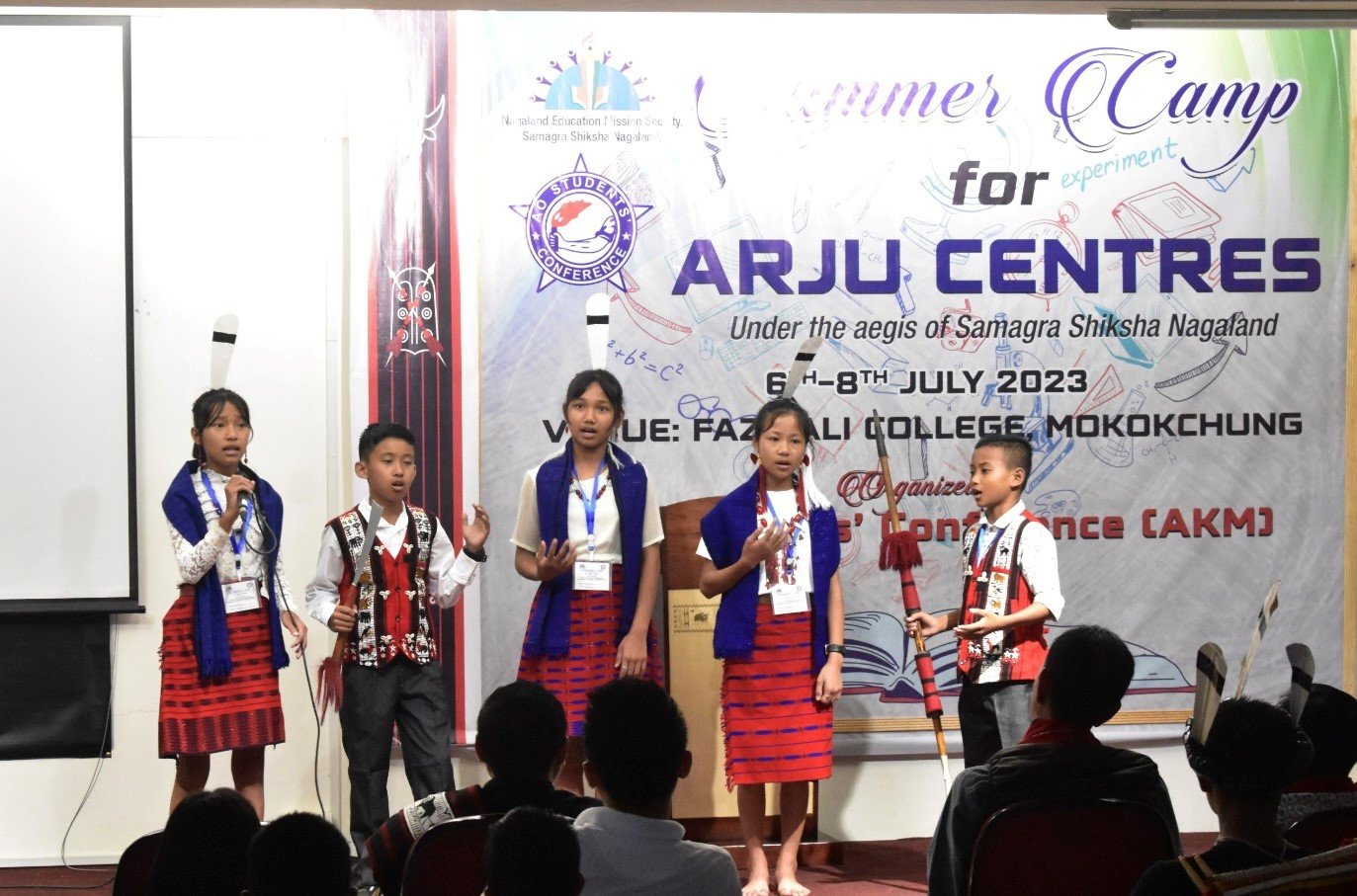The second day of the Summer Camp organized by the Ao Students’ Conference (AKM) for the Arju Centers on July 7 featured a variety of enriching activities. The delegates actively participated in a Green Audit, which involves assessing and evaluating the environmental impact of an organization or institution. The activity focused on promoting sustainability and environmental awareness among the participants.
Another hands-on learning session was conducted on Livestock Farming as an Entrepreneurial Enterprise. This session aimed to provide the delegates with practical knowledge and skills related to livestock farming and entrepreneurship. It covered topics such as animal care, breeding, nutrition, and the business aspects of running a livestock enterprise.
Download Nagaland Tribune app on Google Play
https://play.google.com/store/apps/details?id=com.news.nagalandtribune < Hyperlink >
As part of their visitations, the delegates had the opportunity to explore various departments of Fazl Ali College (FAC), Mokokchung. The visit was aimed to expose the participants to higher education institutions and the range of academic disciplines and facilities available. The students had interactions with faculty members, explored laboratories or libraries, and gained insights into college life.
Meanwhile, the centre mentors, who are responsible for guiding and supporting the students at the 12 Arju Centres, received pedagogical skills training focused on writing and teaching mathematics. This training aimed to enhance their teaching abilities, particularly in the subject of mathematics, and equip them with effective strategies for instruction and student engagement.

The second day of the AKM Summer Camp concluded with a captivating cultural program where students from the Arju Centres shared their experiences. They highlighted the skills they learned and the improvements they observed in their studies with the assistance of the centres. This cultural program provided a platform for the students to showcase their talents and achievements, boosting their confidence and encouraging further progress.
During the program, the mentors of the 12 centres also presented reports on the progress of their respective centres. They emphasized how the children have gained enlightenment through learning various traditional practices and cultural knowledge. Additionally, they highlighted the significant improvement in the students’ academic performance, which can be attributed to the remedial classes provided in various subjects at the Arju Centres. The reports showcased the positive impact and effectiveness of the centres’ educational initiatives in the students’ overall development.
Sentinenla, the District Education Officer of Mokokchung shared that numerous villages are now expressing their desire to have Arju Centres established in their communities as well.
She expressed her believe that Centres offer a unique blend of traditional and modern educational systems and urged the twelve Arju centres to utilize the learning period effectively and encouraged the learners to become masters of their skills. She emphasized the importance of using one’s skills and talents to their fullest potential and discovering new talents along the way.

Sentinenla, the District Education Officer of Mokokchung
The DEO assured that if individuals take the learning period seriously and focus on upskilling their talents, they will not face unemployment issues in their lives. She encouraged learners to make their capabilities quality-oriented, ensuring that they produce high-quality work in their respective fields.
She also expressed her appreciation for the mentors and acknowledged their efforts. She motivated them to continue working hard, emphasizing that the achievement of learning outcomes greatly depends on their mentorship. Furthermore, Sentinenla highlighted the importance of initiators and learners giving their best efforts and spreading the word about their accomplishments to other communities. By setting an example, they can inspire others to follow suit.

R Ayim Longkumer from Ao Senden
R Ayim Longkumer, a representative of Ao Senden, highlighted the importance of education as an all-round development of a child, echoing the sentiments of educationists. He emphasized the significance of skill development in today’s world, regardless of the number of degrees one possesses. Longkumer stated that nurturing should begin from childhood, and the current education curriculum in Nagaland falls short in providing holistic development for children. He suggested that Arju centres could fulfil this need.
According to Longkumer, when an individual achieves goals, it benefits not only themselves but also the village. He stressed the necessity of all-round development for learners, as simply knowing how to read, write, and speak does not make a person truly literate. Quality education is crucial for applying the knowledge acquired in school effectively and therefore encouraged educators in the state to think on a higher level.
Longkumer emphasized the importance of identifying one’s talents and skills and setting objectives accordingly. He emphasized that learning should not be solely aimed at obtaining government services, as these services are meant to serve the government. Instead, he urged individuals to develop skills that would enable them to take over private enterprises or establish their own professions.
Longkumer encouraged learners to focus on how much they can contribute to society through their learning, rather than how much they can receive from society.
In conclusion, he urged individuals to have clear aims and a clear vision of their learning journey stating that focus should be on personal growth and making a positive impact on society.
The cultural program of the AKM Summer Camp was made even more special by the captivating traditional presentations from various Arju Centres, which showcased the rich cultural heritage and traditions of the Ao Nagas. These presentations highlighted the unique customs, rituals, music, dance, and art forms that have been passed down through generations. The traditional presentations from the Arju Centres made a delightful addition to the event, creating a deeper connection between the attendees and the rich cultural tapestry of the Ao Nagas.


